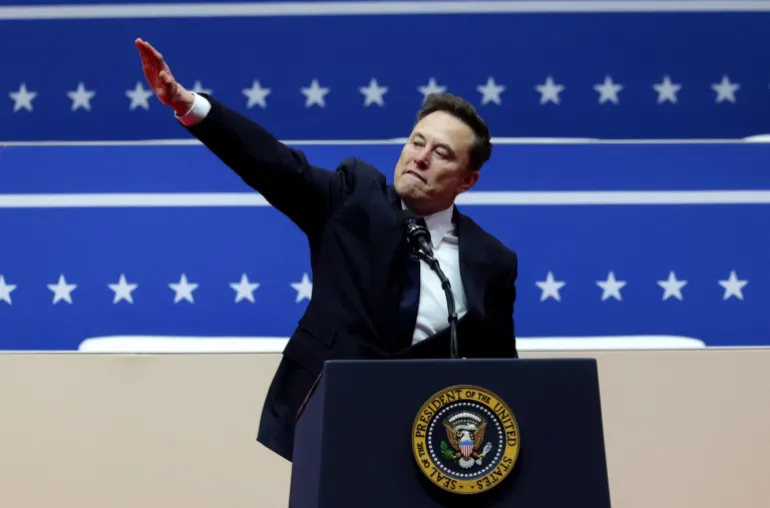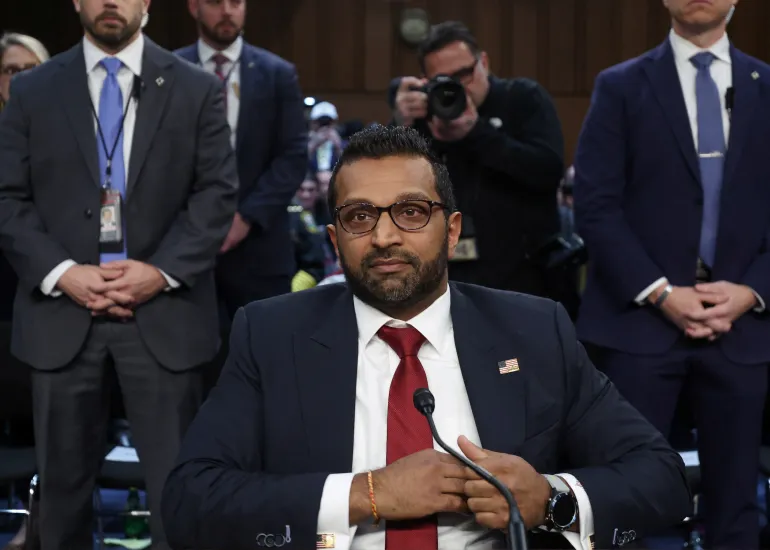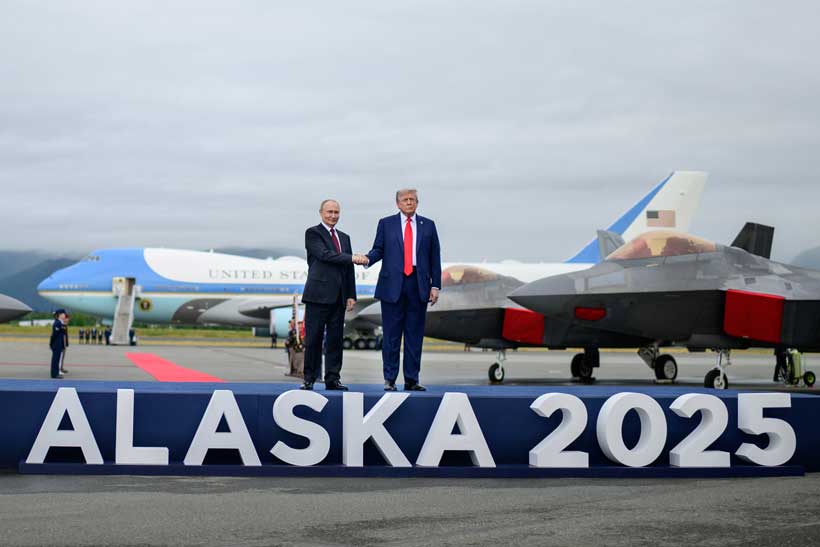Why is ADL, the Jewish advocacy group, receiving blowback from MAGA? | The Far Right News
The Anti-Defamation League (ADL) has become the target of a sustained right-wing backlash after the US-based Jewish advocacy group included an organisation founded by slain right-wing figure Charlie Kirk in its online database on extremism.
The blowback escalated sharply on Wednesday after FBI Director Kash Patel announced that the bureau would sever ties with the ADL, accusing the prominent advocacy group of spying on Americans.
Tech billionaire Elon Musk’s post calling the ADL a “hate group” set off a firestorm of criticism online, forcing the group to scrap the “Glossary of Extremism and Hate”, which contained more than a thousand entries on groups and movements with connections to hateful ideologies.
But that has not subdued the backlash from conservatives – the base of the governing Republican Party.
So, what’s ADL’s online database, and why has it triggered MAGA (Make America Great Again) rage? And how has the nonprofit, which backed the crackdown on pro-Palestine campus protests by the administration of US President Donald Trump, ended up ruffling feathers across the political spectrum?
What is ADL?
The ADL is one of the oldest and most influential Jewish advocacy groups in the United States. It was founded in 1913 by members of the B’nai B’rith – Hebrew for “Sons of the Covenant”, a Jewish fraternal organisation – to counter anti-Semitism and prejudice against Jews.
The group, which calls itself “a global leader in combating antisemitism”, started with its original mission, “to stop the defamation of the Jewish people and to secure justice and fair treatment to all”.
Over time, the ADL grew into a national force with branches spread across the country. It works closely with law enforcement agencies to train officers on identifying bias-motivated violence. It also develops programmes and resources on anti-Semitism and the Holocaust, partnering with schools, universities and communities.
Its monitoring of right-wing racist and anti-LGBTQ+ extremism also allowed it space within the US’s liberal Jewish community.
Since its inception, the ADL has argued that anti-Zionism could lead to anti-Semitism. But in the past couple of decades, the nonprofit has been pushing to adopt the International Holocaust Remembrance Alliance (IHRA) definition of anti-Semitism, which conflates some criticism of Israel with anti-Semitism. The ADL has also backed a controversial resolution passed by the US Congress that defined anti-Zionism as anti-Semitism.
The ADL is a well-resourced civil society group, with around $163m in revenue last year alone.

What caused the backlash against ADL?
The recent backlash was triggered after several influential right-wing social media accounts began posting screenshots of the ADL’s entry on Kirk’s organisation, Turning Point USA, in its “Glossary of Extremism”.
Kirk, who is credited with galvanising young voters for Trump, was assassinated last month.
Though Turning Point USA was not listed as an “extremist organization”, the nonprofit had documented incidents where its leadership and affiliated members had made “racist or bigoted comments”.
ADL’s entry on “Christian Identity” – which the nonprofit identified as an extremist theology that promotes white supremacy – also drew widespread criticism from right-wing influencers.
The ADL has long positioned itself as a nonpartisan watchdog. But conservatives have increasingly argued that it has become politically aligned with progressive causes, including the group’s partnerships with social media companies in moderating hate-speech policies.
Jonathan Greenblatt, the ADL’s CEO, has been accused of “weaponising anti-Semitism” to attack critics of liberal policies and of conflating right-wing populism with hate speech in the past.
In the weeks following Kirk’s assassination, the US has seen a wave of right-wing backlash against public figures who criticised him, with several commentators and journalists facing professional repercussions – including the brief suspension of a television show by comedian Jimmy Kimmel and the firing of Washington Post columnist Karen Attiah.
What was in ADL’s online database?
The ADL “Glossary of Extremism and Hate” was an online, searchable database launched in March 2022 by the organisation’s Center on Extremism. After the backlash from right-wing influencers, mostly from the MAGA camp, the ADL quietly moved to retire its database from the public.
The database contained more than 1,000 entries providing overviews and definitions of terms, symbols, slogans, tactics, publications, groups, and individuals associated with various extremist ideologies, hate movements, and related activities.
The resource covered a broad spectrum, including white supremacism, anti-Semitism, anti-Muslim bigotry, and extremism on the far right and far left. The glossary reportedly included groups like the Proud Boys, the Nation of Islam, the Oath Keepers, and others.
The ADL, in its statement, argued that “an increasing number of entries in the Glossary were outdated”, and “a number of entries [were] intentionally misrepresented and misused”.
The organisation further said that it wanted to focus on exploring “new strategies and creative approaches to deliver our data and present our research more effectively”.
The list is no longer publicly available on ADL’s site, and the original URL now redirects to the organisation’s home page.

How did Musk get into this?
The online smear campaign gained traction on Sunday night after billionaire Elon Musk started interacting with posts targeting the ADL.
Musk, who has more than 227 million followers on X, said, “The ADL hates Christians, therefore it is is [sic] a hate group.”
The ADL’s operations encourage murder, Musk said in another reply to a post on X, formerly Twitter, which he bought in 2022 after paying $44bn.
Musk’s attacks on the ADL still came as a shock to some. ADL’s Greenblatt has, in fact, praised Musk several times, including in 2023 for saying that X would block use of the pro-Palestinian slogan “from the river to the sea”.
That applause reportedly led to the resignation of a top ADL executive, Yael Eisenstat, who headed the nonprofit’s Center for Technology and Society, and the group lost several donors.
The ADL has also criticised Musk, saying X’s Grok chatbot promoted pro-Nazi ideology. The chatbot has praised Adolf Hitler, and called itself “MechaHitler”.
Former and current ADL employees have told Jewish Currents, a US-based progressive publication, that Greenblatt has repeatedly given a pass to Musk’s white nationalist sympathies if they help the ADL fight anti-Zionism – a pattern that reportedly escalated after the October 7, 2023 Hamas attack on Israel, followed by Israel’s now two-year-long war on Palestine, which has been dubbed genocide by an United Nations inquiry panel.
Then again, earlier this year, Greenblatt came to Musk’s defence after several Jewish lawmakers and civil society groups condemned Musk’s fascist-style salutes on stage during a speech after Trump’s re-election.
The ADL had posted: “It seems that Elon Musk made an awkward gesture in a moment of enthusiasm, not a Nazi salute.”
Why did the FBI snap ties with ADL?
The FBI’s decision to cut ties with the ADL also marks a sharp rupture in a partnership that had lasted for decades, at least since the 1940s, rooted in joint efforts to train law enforcement officers and monitor extremist threats across the US.
The move was announced by FBI chief Patel just 24 hours after Musk joined the online campaign, accusing the ADL of having “become a political front masquerading as a watchdog”.
Patel also targeted James Comey, an American lawyer who served as the director of the FBI from 2013 to 2017, during the era of US President Barack Obama.
“James Comey wrote ‘love letters’ to the ADL and embedded FBI agents with them – a group that ran disgraceful ops spying on Americans,” Kash said in a post on X, without offering any more clarity on this.
“That era is OVER. This FBI won’t partner with political fronts masquerading as watchdogs,” he concluded.

Why is ADL accused of pro-Israel bias and of suppressing pro-Palestinian activism?
The ADL has also faced criticism from left-wing activists for exhibiting a pro-Israel bias and suppressing pro-Palestinian activism, particularly in the wake of widespread protests across US campuses over the Gaza war that has killed more than 67,000 Palestinians and turned the Palestinian enclave into ruins.
The advocacy group has dubbed grassroots protests against Israel’s genocidal campaign in Gaza as “pro-Hamas activism”, while its CEO Greenblatt has described the Jewish groups calling for a ceasefire as “the ugly core of anti-Zionism”.
The ADL also publicly campaigned against campus protests last year, describing some demonstrations as “antisemitic hate rallies”. The group urged university administrators and government officials to take action against protest organisers, and pressured institutions to censor or discipline dissenting voices.
ADL’s Greenblatt praised Trump for withholding $400m in grants to Columbia University after campus protests and complimented the arrest of Columbia pro-Palestinian activist Mahmoud Khalil.
“We appreciate the Trump Administration’s broad, bold set of efforts to counter campus antisemitism – and this action further illustrates that resolve by holding alleged perpetrators responsible for their actions,” the ADL posted above a tweet about Khalil’s arrest.
The ADL’s collaboration with the US administration has dented its credibility, and several staff have resigned, citing the organisation’s overt emphasis on pro-Israel advocacy.
“The ADL has a pro-Israel bias and an agenda to suppress pro-Palestinian activism,” an ADL employee told The Guardian newspaper last year.


